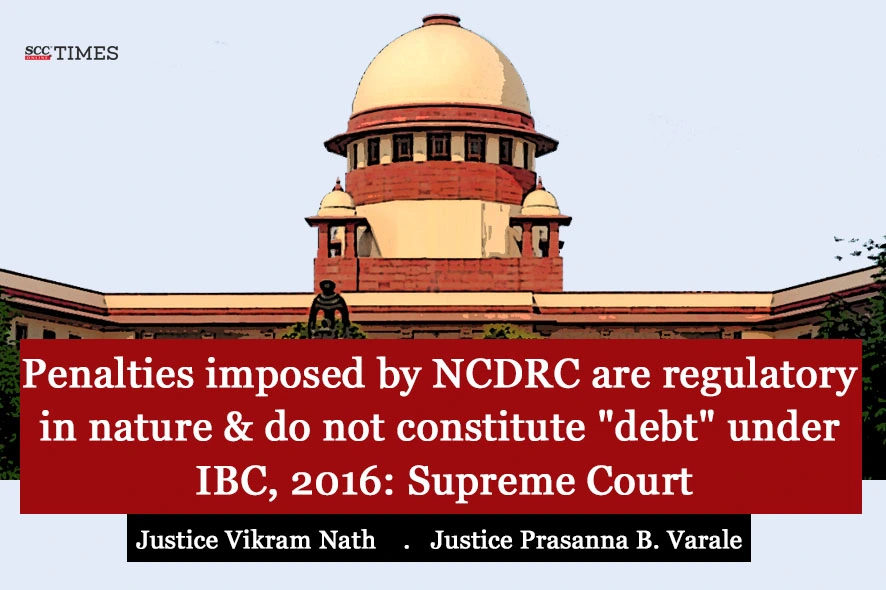Supreme Court: While considering the instant appeal against the final judgment and order passed by the National Consumer Disputes Redressal Commission (NCDRC), wherein 27 penalties were imposed on the appellant for failing to deliver possession of residential units to homebuyers as per the agreed timeline; the Division Bench of Vikram Nath* and Prasanna B. Varale, JJ., had to consider whether execution proceedings under Section 27 of the Consumer Protection Act, 1986 (CP Act), can also be stayed during an interim moratorium under Section 96 of the IBC. The Court held that penalties imposed by the NCDRC are regulatory in nature and do not constitute “debt” under the Insolvency and Bankruptcy Code, 2016 (IBC). The moratorium under Section 96 of the IBC does not extend to regulatory penalties imposed for non-compliance with consumer protection laws.
The Court emphasised that the legislative intent behind consumer protection laws are to safeguard the interests of consumers and ensure accountability from service providers. Permitting a stay on regulatory penalties under the guise of insolvency proceedings would undermine the very purpose of the CP Act and embolden errant developers to escape liability through insolvency proceedings. “Homebuyers, many of whom invest their life savings in purchasing residential units, are already in a precarious position due to delays in possession and breaches of contractual obligations. Staying penalties that serve as deterrence against such unfair practices would render consumer protection mechanisms ineffective and erode trust in the regulatory framework”.
Background:
The appellant is engaged in real estate development and has several pending consumer complaints before the NCDRC filed by homebuyers alleging delay in possession, deficiency in service, and breach of contractual obligations. The NCDRC, in its final judgment dated 10-08-2018 along with other connected matters, allowed the complaints and directed the appellant to complete construction, obtain the requisite occupancy certificate, and hand over possession and imposed 27 penalties on the appellant for deficiency in service by failing to deliver possession within a reasonable time. Respondents 1 and 2, as decree holders, subsequently filed execution applications seeking execution of the abovementioned order of the NCDRC as the appellant failed to comply with the directions of the NCDRC.
Subsequently, the appellant, facing insolvency proceedings before the National Company Law Tribunal under the IBC, moved an application before the NCDRC seeking a stay of execution proceedings.
The instant matter arises from an application filed by the appellant challenging the execution of multiple penalty orders imposed by the NCDRC during the pendency of insolvency proceedings against the Corporation. The appellant contended that the imposition and execution of these penalties should be stayed due to the pendency of insolvency proceedings initiated under Section 95 of the IBC.
Court’s Assessment:
Perusing the matter, the Court stated that there is a fundamental distinction between civil and criminal proceedings concerning a debt moratorium. While civil proceedings are generally stayed under IBC provisions, criminal proceedings, including penalty enforcement, do not automatically fall within its ambit unless explicitly stated by law. The penalties imposed by the NCDRC are regulatory in nature and arise due to non-compliance with consumer protection laws. They are distinct from “debt recovery proceedings” under the IBC.
The Court pointed out that moratorium under Section 96 of the
The moratorium under Section 96 of the IBC is intended to provide temporary relief to debtors by preventing certain proceedings against them during the resolution process. However, this protection is not absolute and does not extend to all categories of debts. The legislative intent behind the moratorium is to ensure that the debtor’s assets are preserved for an efficient resolution process and to prevent creditors from taking unilateral actions that may frustrate the objective of insolvency proceedings.
Explaining the difference between criminal proceedings and punitive actions, the Court stated that while a criminal proceeding is initiated by the State against an accused to determine guilt and impose penal consequences; punitive actions such as those imposed by the NCDRC, are meant to ensure compliance with the law and to act as a deterrent against future violations. Section 27 of the CP Act empowers consumer fora to impose penalties to ensure adherence to consumer protection norms.
The Court explained that the statutory scheme of the IBC makes it clear that the protection under the moratorium does not cover all forms of liabilities, particularly those classified as “excluded debts” under Section 79(15) of the IBC. It was pointed out that in the instant case, the damages awarded by the NCDRC arise from a consumer dispute, where the appellant has been held liable for deficiency in service. Such damages are not in the nature of ordinary contractual debts but rather serve to compensate the consumers for loss suffered and to deter unethical business practices. Since such damages are covered under “excluded debts” as per Section 79(15) of the IBC, they do not get the benefit of the moratorium under Section 96 of the IBC, and their enforcement remains unaffected by the initiation of insolvency proceedings.
Furthermore, the rationale behind excluding such liabilities from the moratorium is rooted in public policy considerations. “If damages arising from legal violations, consumer protection claims, or penalties imposed by courts and tribunals were to be shielded under the moratorium, it would create an unfair advantage for errant entities and individuals, allowing them to evade their legal obligations under the guise of insolvency”. The IBC, being a special law meant to balance the interests of all stakeholders, does not intend to provide relief to those who have been held liable for statutory breaches or misconduct.
The IBC has been designed to deal with insolvency resolution and financial distress, whereas consumer protection laws exist to uphold consumer rights and ensure fair business practices. The penalties under Section 27 of the CP Act are aimed at compelling compliance and cannot be equated with recovery of an outstanding debt. “The appellant cannot claim that such penalties fall within the scope of a debt moratorium, as they do not constitute financial liabilities owed to a creditor but rather statutory obligations enforced to uphold consumer rights. Allowing the stay of such penalties would effectively enable businesses to flout consumer protection mandates by merely initiating insolvency proceedings, which would be an unintended and dangerous consequence of a misinterpretation of the law”.
The Court noted that the instant case does not involve a mere financial dispute but concerns the enforcement of consumer rights through regulatory penalties. Given that the legislative intent behind the CP Act is to ensure compliance with consumer welfare measures, staying such penalties would be contrary to public policy. Furthermore, the Court said that the appellant cannot invoke insolvency proceedings as a shield to evade statutory liabilities. The objective of the IBC is to provide a mechanism for resolving financial distress, not to nullify obligations arising under regulatory statutes.
Therefore, with the afore-stated analysis, the Court deemed it fit to dismiss the appeal and directed the appellant to comply with the penalties imposed by the NCDRC within a period of eight weeks from the date of this judgment.
CASE DETAILS
|
Citation: Appellants : Respondents : |
Advocates who appeared in this case For Petitioner(s): For Respondent(s): |
CORAM :








